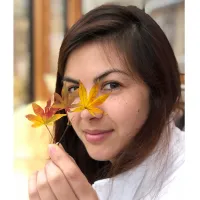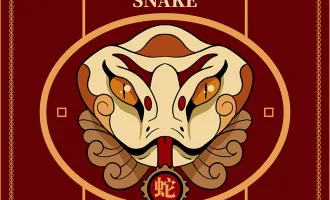
Q&A With UCSF Alumna & Poet Jenny Qi
In our latest podcast, we chat with UCSF alumna Jenny Qi, PhD, ’17, about how she went from publishing cartoons and news articles for Synapse to publishing an anthology of poetry, Focal Point, which received the 2020 Steel Toe Books Poetry Award.
The book’s website explains that this anthology was written largely while Qi was “a young PhD student conducting cancer research after her beloved mother’s death from cancer, the collection turns to ‘all the rituals of all the faiths,’ invoking Western and Eastern mythology and history, metaphors from cell biology, and even Jimi Hendrix, as Qi searches for a container to hold grief.”
While at UCSF, she eventually became Synapse’s editor-in-chief, while also researching cancer biology and helping to establish a UCSF science podcast called Bone Lab Radio.
Qi graduated from the Biomedical Sciences Program and now works at a competitive intelligence firm. Her work has been featured in such publications as The New York Times, The Atlantic, Tin House, and ZYZZYVA, among others.
Below is an excerpt of the interview is conducted for Synapse by editor-in-chief Victoria Turner. Listen to the entire interview on the Synapse podcast.
Qi’s Book, Focal Point
Synapse: Can you tell me where the title of your new book comes from?
Jenny Qi: The title of the book used to be the title of the first poem, actually.
The book is structured so that the first poem is almost like a [scientific] abstract. So I wrote that poem reflecting on both the definition of a focal point both in optics, the point at which parallel lines converge and also diverge, and also the idea of having a central focus and how we can hone in on that central focus to the exclusion of everything else in arbitrary and sometimes self-centered ways. [I was also] thinking about how there are so many other things going on around that central focal point.
And I realized that was what the book as a whole was exploring, so at some point I made that change [for the book title].
Synapse: What was it like going from writing these individual pieces and turning them into a collection? You mentioned you were going through grief and using poetry to interpret that. Did you know going in that you would turn the poems into a collection later?
Qi: Absolutely not. I had no intention when I started grad school of being a professional poet in any way. I just didn’t think that was realistic. I always kind of wanted to be a writer, but I never thought that was a realistic path to pursue, especially being the only child of Chinese immigrants who went through the Cultural Revolution in China.
So, the short answer is no, but I used to go to this workshop run by one of the physicians out of his office. His name is David Watts, and he ran this workshop once a week. I started going [to the workshop] in my second year of grad school and went pretty regularly.
A lot of the folks in this group were older so it was kind of nice, because they had more of an intimate familiarity with grief than most people my own age...I could find some sort of space for that there.
After a few years of going, David just turned to me after workshop one day and said, “Where is your book?” And I said, “What book?”
But I had been starting to be more serious about a writing career of some kind over that period, so I started putting [the poems] together into a collection after that.
Synapse: Do you have any last thoughts about how science, writing, and life intersect in your book?
Qi: I actually have a fair number of poems in here that are more science-y, which I didn’t realize. If you had asked me a few years ago whether science intersected much with my writing, I probably would have said no. It was only through putting this together that I realized there is actually a lot of scientific influence on this, if only because that was my life for six years.
To give a few examples, I have a poem in here that is titled “Telomeres & a 2AM (Love) Poem.” I have a series of biology lesson poems in the second section, and I structured the earlier sections almost like a poetic lab notebook, where it’s short biology poems separating poems that are scenes from my non-lab life.
So, there is a lot of that intersection here. Because in the end, as much as I might have viewed my writing and science lives as separate, they’re not really. As much as you try to separate things, it’s all part of the life I am living. So, I think it’s challenging and not even desirable to keep things so separate.
Qi’s Experiences Working with Synapse
Synapse: How long did you work with Synapse?
Qi: Around three or four years. I started sometime around my second year, and I stopped in my fifth year when I was getting ready to graduate.
Synapse: How did you get started with the newspaper?
Qi: I started off doing cartoons, drawing little cartoons during journal club. So, I started off by publishing BMS Cartoons, because I was in BMS. And [next] I did medical myth buster cartoons.
After that, I just took on more and more assignments. I knew pretty early on that I didn’t want to stay in academia. I was interested in exploring science communication.
Synapse: So how was that transition from cartooning to the writing side of things? Were you writing before that time?
Qi: I was always into writing, but I think it took me a long time to figure out how to balance writing and science and/or how to merge them. In my mind, they were very separate. This book that just came out is a book of poems, which was not something I ever planned to combine with science. I thought that those had to be two separate lives, and guess I am still keeping them somewhat separate.
Synapse: But they exist within you, together.
Qi: Yes. [laughs]
Synapse: You’ve worked in several genres — poetry, journalism, cartoons, and essays as well. How do those speak to you in different ways and which do you lean towards nowadays?
Qi: It changes over time. While I was in grad school, I was leaning more on poetry to deal with the personal issues, and to deal with grief. I also enjoyed journalism in that time because I enjoy deep diving into topics for short periods, like a shorter version of grad school. [laughs]
I enjoyed the opportunity to shed a light on topics that I thought were important and that I thought people should read about.
When I was at Synapse, I wrote a lot about end of life, medical humanities, and diversity in STEM, things like that. It felt like something that was important. Especially when things were really slow in lab, I could do something I [could] view as important.
Synapse: I can relate to that. It’s definitely nice to have a clear, concise project and “publication.” Do you have any memorable pieces that you remember working on at Synapse?
Qi: When I first started, I covered the health insurance changes... when they were switching students over to UC SHIP. It was my first time really doing journalism, [which] wasn’t something I had even considered before grad school.
I also started out the Life of a Grad Student series. We anonymously interviewed grad students in every year about their experiences and what were things they struggled with, to try and normalize some of those struggles that can feel isolating when you’re in grad school.
This interview has been edited for length and clarity.



